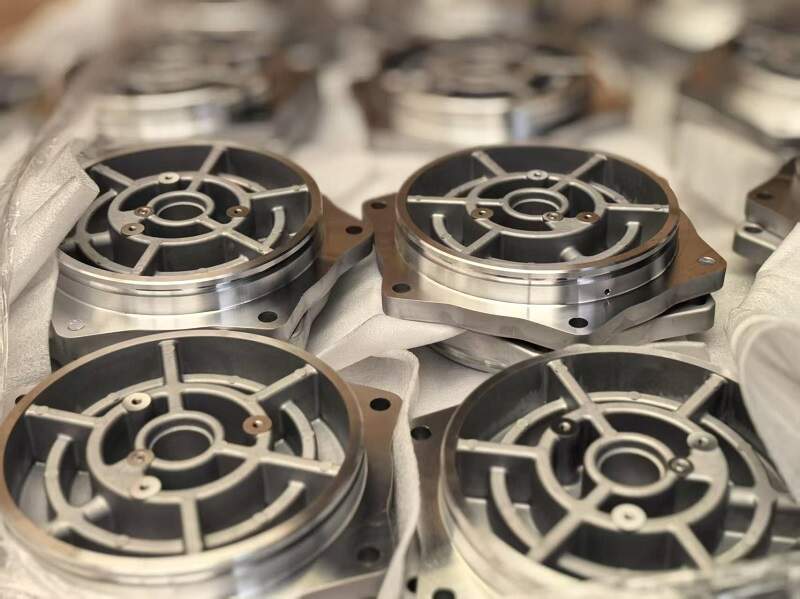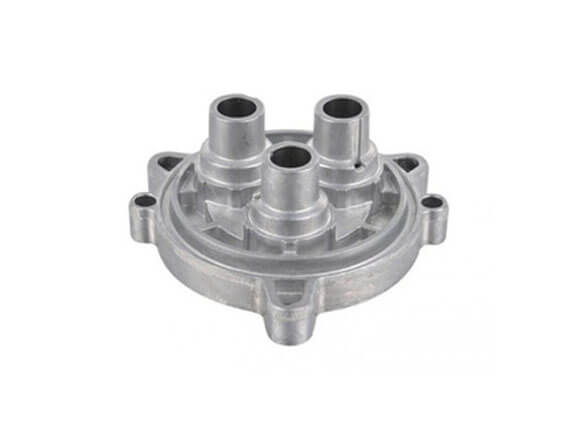How aluminum casting contributes to sustainable manufacturing
Wiki Article
Exploring the Ingenious Processes Behind Modern Light Weight Aluminum Foundry Procedures
Modern aluminum shop operations are undertaking substantial transformation. Automation and AI are improving production approaches, improving both effectiveness and precision. The combination of 3D printing is enhancing mold and mildew development, while sustainability methods are becoming extra essential. Each of these developments plays an essential role in redefining the industry. Nonetheless, the ramifications of these adjustments expand past mere manufacturing effectiveness. What chances and obstacles exist ahead for aluminum shops in this advancing landscape?The Function of Automation in Light Weight Aluminum Foundries

Additionally, automation adds to boosted security standards within the foundry atmosphere. By moving unsafe jobs to makers, human workers can concentrate on supervisory duties and quality control, minimizing the threat of mishaps. Furthermore, information analytics originated from automated processes offer beneficial understandings right into functional performance, causing much better decision-making and continual enhancement. As the demand for light weight aluminum products expands, the fostering of automation modern technologies will likely broaden, additionally transforming the landscape of light weight aluminum foundry procedures.
Innovations in Casting Technologies
Recent innovations in casting innovations are changing light weight aluminum factory procedures. Innovations such as 3D printing assimilation, advanced alloy solutions, and automated process optimization are boosting efficiency and product high quality. These advancements are essential in fulfilling the progressing demands of the industry.3D Printing Integration
Incorporating 3D printing technology right into aluminum factory operations has actually changed standard casting techniques, enhancing both efficiency and accuracy. This ingenious technique permits the fast production of complicated mold and mildews and cores, significantly lowering lead times and material waste. By using additive production, shops can create elaborate geometries that were formerly difficult or difficult to attain with traditional methods. The versatility of 3D printing likewise allows quick style adjustments, cultivating an extra dexterous manufacturing process. In enhancement, this combination sustains making use of light-weight frameworks, which is significantly essential in industries such as automobile and aerospace. As aluminum shops remain to adopt 3D printing, they position themselves at the forefront of technological improvement, driving renovations in item top quality and operational abilities.Advanced Alloy Formulations
The growth of advanced alloy formulas has significantly improved spreading innovations in aluminum foundry procedures. These formulations incorporate different aspects, such as magnesium, silicon, and copper, to enhance mechanical buildings and thermal resistance. By tailoring the composition of aluminum alloys, suppliers can attain particular performance features that fulfill the demands of varied applications, from vehicle parts to aerospace structures. Making use of sophisticated alloys likewise contributes to decreased weight and enhanced strength, which are essential variables in modern engineering. In addition, advancements in alloy growth enable far better fluidness during spreading, leading to boosted surface area finishes and lowered flaws. Generally, advanced alloy formulations represent a considerable leap onward, positioning aluminum factories to satisfy the evolving needs of various sectors efficiently.Automated Process Optimization
Advancements in casting innovations have actually paved the way for computerized procedure enhancement in light weight aluminum factory procedures. By integrating innovative software application and real-time information analytics, foundries can currently streamline production processes and enhance quality assurance. Automated systems monitor variables such as pressure, cooling, and temperature rates, permitting instant changes that reduce issues and waste. In addition, artificial intelligence algorithms examine historic efficiency data to predict suitable setups, thereby boosting performance and minimizing cycle times. Robotics additionally play a considerable function, dealing with repetitive tasks that boost security and precision. Generally, these innovations not only drive functional effectiveness however likewise enable shops to fulfill the expanding demand for top notch light weight aluminum components in various sectors.Smart Production and Industry 4.0 Assimilation
The assimilation of Smart Manufacturing and Sector 4.0 within light weight aluminum factories is changing operational efficiency. By leveraging IoT technologies, automation, and robotics, factories can enhance production processes and decrease downtime. In addition, data analytics supplies important insights that boost decision-making and drive constant enhancement.IoT in Foundry Workflow
As producers significantly accept the Net of Points (IoT), shop procedures are experiencing a transformative change in the direction of wise production and Industry 4.0 combination. Aluminum Foundry. IoT innovations make it possible for real-time data collection and analysis, enhancing decision-making procedures and operational efficiency. Sensing units and linked gadgets monitor tools efficiency, material use, and environmental conditions, find out here enabling positive upkeep and source optimization. This connectivity promotes a much more dexterous production environment, where adjustments can be made quickly in response to market demands. In addition, IoT facilitates enhanced traceability and quality assurance, as information from the entire production cycle can be easily accessed and assessed. On the whole, the combination of IoT in foundry procedures significantly improves productivity and drives innovation in aluminum production processesAutomation and Robotics Combination
Automation and robotics combination is changing light weight aluminum factory operations by improving effectiveness and accuracy. This transformative strategy enhances procedures such as molding, putting, and completing, reducing human mistake and increasing result uniformity. By utilizing sophisticated robot systems, factories can achieve higher production rates while maintaining stringent high quality criteria. Automated systems additionally make it possible for real-time tracking and flexible control, permitting quick changes to manufacturing parameters. In enhancement, the combination Get the facts of robotics decreases labor expenses and reduces safety and security dangers related to hands-on handling of molten metal. As factories welcome clever production concepts intrinsic in Sector 4.0, the harmony in between automation and robotics solidifies their affordable side, leading the way for lasting development and development in the light weight aluminum casting sector.Information Analytics for Efficiency
Utilizing data analytics substantially improves performance within aluminum shop operations, lining up with wise production and Market 4.0 principles. By leveraging real-time information collection and evaluation, shops can monitor manufacturing processes, anticipate tools failures, and maximize source allocation. This data-driven approach helps with informative decision-making, allowing supervisors to determine bottlenecks and improve operations. In addition, predictive analytics encourages factories to prepare for market demands, therefore decreasing waste and guaranteeing prompt item distribution. Combination of information analytics with IoT gadgets enhances operational visibility, cultivating an aggressive maintenance society. Inevitably, carrying out these sophisticated logical techniques not just boosts performance yet also drives advancement, positioning light weight aluminum shops to meet the progressing needs of the market while preserving one-upmanships in a quickly changing landscape.Sustainable Practices in Aluminum Casting
While the aluminum casting market has typically faced ecological challenges, lots of factories are currently adopting sustainable practices to mitigate their impact (Precision aluminum casting). A substantial emphasis has actually gotten on recycling light weight aluminum scrap, which not only decreases waste however likewise conserves power contrasted to primary light weight aluminum manufacturing. Ingenious melting modern technologies, such as induction furnaces, boost power performance and reduced greenhouse gas exhaustsIn addition, shops are executing closed-loop water systems to reduce water usage and minimize thermal contamination. Making use of eco-friendly binders in mold-making processes is getting traction, more lowering unsafe discharges.
Some centers are spending in renewable power sources to power operations, aligning with global sustainability objectives. By incorporating these techniques, the aluminum casting industry is progressing towards a more environmentally accountable future, informative post demonstrating that financial development can coexist with eco-friendly stewardship - aluminum casting. These initiatives show a dedication to sustainability and the value of ecological responsibility in manufacturing
Quality Assurance Innovations
As the light weight aluminum spreading market developments towards sustainability, the value of quality control innovations comes to be increasingly apparent. Modern light weight aluminum shops are adopting sophisticated technologies to boost their quality control procedures. Methods such as real-time surveillance and data analytics allow suppliers to identify flaws and variances early in the production cycle. Implementing automatic assessment systems geared up with equipment learning algorithms guarantees that products meet rigid top quality criteria while reducing human error.In addition, the integration of non-destructive testing techniques, such as radiographic and ultrasonic assessments, supplies much deeper insights right into the integrity of castings without harming the product. These innovations not only enhance item reliability but additionally reduce waste, straightening with sustainability objectives. In enhancement, the fostering of standard quality frameworks assists enhance operations throughout various shops, ensuring consistency in outcome. Collectively, these developments are improving top quality control, cultivating a society of quality within the light weight aluminum spreading market.
Future Fads in Aluminum Shop Procedures
What innovations exist in advance for light weight aluminum factory operations? The future of aluminum foundries is positioned for makeover with developments in automation, synthetic knowledge, and sustainable practices. The combination of robotics and automated systems is expected to enhance effectiveness and precision in the casting procedures, lowering human error and labor costs. In addition, AI-driven analytics will make it possible for real-time surveillance and predictive maintenance, maximizing operational performance and decreasing downtime.Sustainability remains a focal factor, with factories increasingly taking on eco-friendly methods, such as utilizing recycled light weight aluminum and creating low-emission melting modern technologies. Technologies in 3D printing are also prepared for to reinvent mold-making, enabling intricate geometries and minimized material waste. As the sector welcomes digitalization, data-driven decision-making will come to be pivotal, making it possible for foundries to respond swiftly to market demands. Collectively, these fads assure to redefine light weight aluminum foundry operations, making them much more reliable, lasting, and versatile to future difficulties.

Regularly Asked Questions
What Safety And Security Measures Are Executed in Light Weight Aluminum Foundry Operations?
Light weight aluminum factory operations execute different precaution, consisting of individual safety equipment, ventilation systems to take care of fumes, regular security training, emergency feedback strategies, and rigid tracking of temperature level and equipment to avoid accidents and warranty employee safety and security.Just How Do Foundries Handle Workforce Educating for New Technologies?

What Products Are Typically Reused in Light Weight Aluminum Foundries?
Light weight aluminum shops commonly recycle scrap aluminum, including post-consumer products like beverage canisters, automotive components, and building products. This reusing process minimizes waste and preserves sources, adding to a much more lasting aluminum production market.Exactly How Does Light Weight Aluminum Spreading Impact the Setting?
Light weight aluminum casting impacts the setting through energy-intensive procedures, greenhouse gas exhausts, and prospective neighborhood air pollution. However, improvements in reusing and sustainable methods can minimize these results, advertising a more eco-friendly strategy to aluminum manufacturing.What Are the Regular Lead Times for Light Weight Aluminum Casting Projects?
Regular preparation for aluminum spreading tasks differ substantially, generally varying from 2 to six weeks. Factors affecting these timelines include intricacy, order dimension, and material accessibility, affecting general production schedules in foundry procedures.
Automation increasingly plays an essential role in aluminum shops, boosting efficiency and precision in the manufacturing process. Improvements in casting technologies have led the means for automatic process enhancement in light weight aluminum shop operations. Harnessing data analytics greatly improves efficiency within aluminum foundry operations, straightening with wise manufacturing and Sector 4.0 concepts. A significant focus has been on reusing light weight aluminum scrap, which not just decreases waste however likewise saves power contrasted to key aluminum production. Aluminum shops generally recycle scrap light weight aluminum, consisting of post-consumer items like beverage canisters, auto components, and construction products.
Report this wiki page